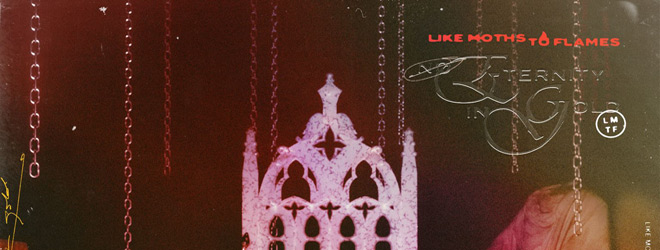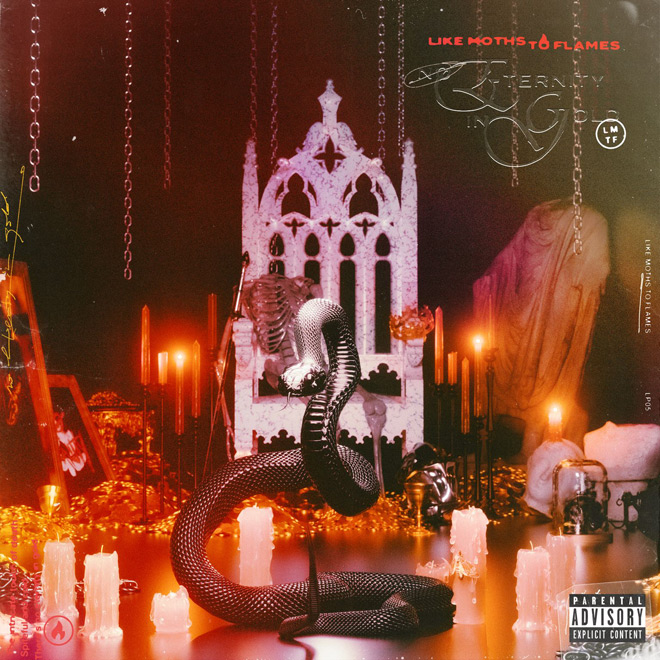
Formed in 2010 after Vocalist Chris Roetter’s departure from Emarosa, Ohio’s Like Moths To Flames has maintained a proud position in the upper echelon of Metalcore throughout the past decade. With their exceptional 2011 debut, When We Don’t Exist, they set the wheels in motion on a career that has seen them touring relentlessly while consistently delivering new music. Each successive release—2013’s An Eye for an Eye, 2015’s The Dying Things We Live For, and 2017’s Dark Divine—has only empowered the band further.
So for their fifth full-length, Like Moths To Flames—Roetter, Guitarists Jeremy Smith and Zach Pishney, and Bassist Aaron Evans—holds nothing back. Produced, mixed, and mastered by the team of Carson Slovak and Grant McFarland (August Burns Red, Rivers Of Nihil), No Eternity In Gold features drums and percussion from Phinehas’ Isaiah Perez. And while the 11-song LP is massive in sound, it’s also deeply personal.
Roetter explains: “The 11 tracks focus on overcoming 11 separate issues that I’m dealing with when I wake up every day. Most prevalently, it’s about struggling with yourself and your own feelings about your ultimate worth. These songs probably showcase more of my own mind than our previous work. I live my life like an open book, and we in the band are all very spiritual people who are in touch with their emotions. I feel that is something that society neglects; we are taught to bury and suppress negative feelings, when we believe that by embracing those emotions, you learn a huge amount about yourself.“
In this, No Eternity In Gold is a trip through the talented vocalist’s mind as he struggles to find peace within himself, and it all begins with “The Anatomy of Evil.” Burning in misery, wallowing in self-imposed isolation, the emotion on display here matches the band’s ferocious assault, mirroring one another in a macabre dance. Next, Evans slams the bass as guest drummer Perez unleashes hell on the soul-searching “Habitual Decline,” before the delicious sucker punch to the senses of “Burn in Water, Drown in Flame.”
There’s a morbid poetry to “Fluorescent White,” a meandering, sludgy groove on “God Complex,” and vicious howls on the agonizing “YOTM.” Progessing from the dark visual metaphors of the first, Roetter seems to taunt himself in “God Complex,” questioning his own worth and legacy, while on “YOTM,” as with much of the LP, there’s a crisis of faith as he struggles with his mental health. This sets the stage for a slightly altered approach, sonically speaking, in the slower “Killing What’s Underneath,” which is composed of fewer screams but no less agony.
Meanwhile, a swarm of technical proficiency creates the paralyzing interior monologue of “A Servant of Plague,” a track that is exactly as incendiary as its title suggests. However, the album’s showstopper is clearly in the paranoid guilt of “Demon of My Own,” with its languid atmospherics, gently weeping guitar, and ample feels. But Like Moths To Flames has no desire to sign off without making waves first, so they amp right back up for the massive “Selective Sacrifice” and the absolutely demonic loss of faith, “Spiritual Eclipse.” In this, they end on some of their strongest notes, providing a conclusion that far outweighs the album’s beginning.
Start to finish, No Eternity In Gold is a weighty collection—topically and sonically. Like sitting back and watching Roetter’s bleak thoughts spiral down a drain, questioning his worth and faith, it is a troublesome album, in that it’s raw with the singer’s personal pain. This is reflected in the band’s severe approach, one that often turns away from melody just as its lyricist self-isolates. There are, of course, those moments, those earworm melodies that haunt us, but in comparison to Dark Divine they are less frequent. Some will no doubt cheer over the brutality, but we see mostly the struggle that went into crafting these songs and appreciate the sincere vulnerability found throughout. For this, Cryptic Rock gives No Eternity In Gold 4 of 5 stars.






No comment